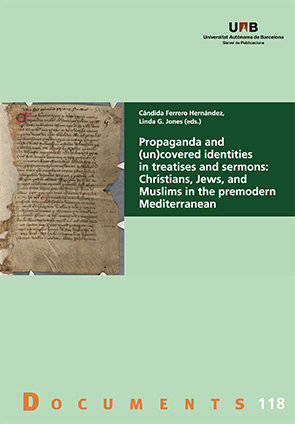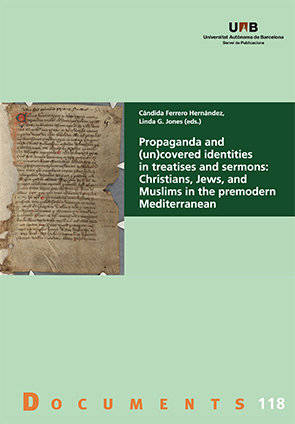
Bedankt voor het vertrouwen het afgelopen jaar! Om jou te bedanken bieden we GRATIS verzending (in België) aan op alles gedurende de hele maand januari.
- Afhalen na 1 uur in een winkel met voorraad
- In januari gratis thuislevering in België
- Ruim aanbod met 7 miljoen producten
Bedankt voor het vertrouwen het afgelopen jaar! Om jou te bedanken bieden we GRATIS verzending (in België) aan op alles gedurende de hele maand januari.
- Afhalen na 1 uur in een winkel met voorraad
- In januari gratis thuislevering in België
- Ruim aanbod met 7 miljoen producten
Zoeken
Propaganda and (un)covered identities in treatises and sermons: Christians, Jews, and Muslims in the
Cándida Ferrero Hernández, Linda G. Jones
Paperback | Engels
€ 16,95
+ 33 punten
Omschrijving
The eleven essays included in this collective volume examine a range of textual genres produced by Christians and Muslims throughout the Mediterranean, including materials from the Corpus Islamolatinum, Christian propaganda and polemical works targeting Muslims and Jews, Inquisition records, and Christian and Muslim sermons. Despite the diversity of the works under consideration and the variety of methodological and disciplinary approaches employed in their analysis, the volume is bound together by the common goals of exploring the propaganda strategies premodern authors deployed for specific aims, be it the unification of religious, cultural, and political groups through discourses of self-representation, or the invention of the political, cultural, religious, or gendered other. Many of the essays offer critical re-readings of works that are obscure or have never been studied, while others shed new light on the cultural and textual interactions between Christians, Muslims and Jews.The volume is divided into four sections, the first of which is comprised of three chapters on the Corpus Islamolatinum that furnish new evidence showing the important role this ?encyclopedia? played in spreading knowledge about Islam and contributing to the creation of propaganda and polemics against Islam among European intellectual circles. The chapters in section two offer novel interpretations of the hermeneutical strategies underlying the composition of polemical works such as the lives of Muhammad and Pedro de la Cavalleria's Zelus Christi. The essays in section three identify some common hermeneutical strategies in the use of anti-Jewish and anti-Islamic arguments to polemicize against religious others or edify Christians and illuminate intertextual relations between authors and genres (disputatio and praedicatio). Finally, section four introduces the gender perspective: the genered nature of the accusations of Judaizing in the analysis of the transcripts of the inquisitorial court of three sisters who were tried in Barcelona in 1496, on the one hand, and two studies that explore the constructions of identities and gender relations reflected in various Islamic sources from opposite ends of the Mediterranean. They offer glimpses of women as subject (s) and as object (s) of preaching and show how such texts can reify or subvert traditional binary gender roles.
Specificaties
Betrokkenen
- Auteur(s):
- Uitgeverij:
Inhoud
- Aantal bladzijden:
- 196
- Taal:
- Engels
Eigenschappen
- Productcode (EAN):
- 9788449089183
- Verschijningsdatum:
- 1/01/2020
- Uitvoering:
- Paperback
- Afmetingen:
- 160 mm x 230 mm
- Gewicht:
- 437 g

Alleen bij Standaard Boekhandel
+ 33 punten op je klantenkaart van Standaard Boekhandel
Beoordelingen
We publiceren alleen reviews die voldoen aan de voorwaarden voor reviews. Bekijk onze voorwaarden voor reviews.









